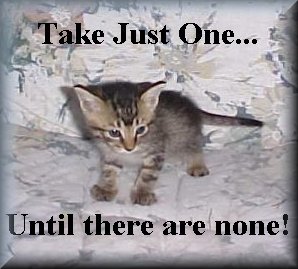
The third Saturday of August is designated as National Homeless Animal Day
and is marked nationally by animal rights groups and shelters with candlelight vigils.
The graphic above is a tiny kitten found after a family moved away and left
the pregnant mother to fend for herself and her litter. A friend of mine,
Lori, is also a catlover and has taken this tiny kitten and its siblings in.
Loving homes will be found for them, and they will be neutered when
they are mature enough.
Although both dogs and cats are abandoned, dogs seem to have an easier time
finding homes. A number of people erroneously believe that dogs need families
but cats can fend for themselves. BOTH need families to lead normal, healthy
lives. Strays are often tortured, shot, poisoned and die early from disease
and injuries... not a pleasant thought to those animal lovers among us. "But
what can I do, I am only ONE person?" you might ask. If only one cat, dog,
kitten or puppy were adopted by each animal lover in this country, we would
no longer have this problem.
There are thousands of animal rights groups and humane societies throughout
the country... some are better than others, some don't deserve the name they
bear... but they cannot be expected to do the job. If all of us can help
just a little, everyone will benefit.
Since my focus is primarily cats, I would like you to check out Alley Cat Allies
who marked their first National Feral Cat Day on Oct. 16, 2001.
Also, this partial list of groups includes good information and links on the sites:
Feline Rescue Network, The Bear Foundation, National Pet Alliance,
The Feral Cat Coalition, and Feral Cats.
Another site is Cats with Franny Syufy, an expert with the About.com site.
She writes:
"In the United States, the biggest challenge is the education of the public
to spay and neuter their pets. Until we all commit to this crucial task, we
are all part of the problem and swimming upstream against a tide of unwanted
kittens that will be dumped at a shelter, abandoned at a park or wildlife
area or given to other humans who will perpetuate the problem.
"The fact is that there are NO native feral cats. They are a species bred in
ignorance by humans too self-occupied or too lazy to deal with the
sterilization of their pets. It is astounding in this day and age that
there are still a number of people who subscribe to the
'let them have a first litter' mentality.
"Veterinarians universally agree that allowing a cat to have a litter before
spaying her serves no useful purpose. The fact is that many veterinarians
now believe that sterilization at a very early age is less traumatic for the
cat and aids in better long-term health for both males and females.
"What happens to these unwanted kittens? Sometimes they are lucky to find
good homes, more often however, when they pass the "cute" stage with no home
in sight, the owners, usually with all good (though misguided) intentions,
take them to a park or other area and dump them to fend for themselves. The
survivors eventually find other unwanted cats and a new feral cat community
is born. Within the community, the unaltered males fight, the females are
bred, and more unwanted kittens are born. Many of the cats, both adults and
kittens, die of starvation, disease, or injuries..."
What can you do?
1. Find out if there is a homeless cat rescue organization in your area. If
2. If there is no organization in your area, consider starting one. The Feral
3. Protest loudly when you hear of feral cats being killed inhumanely. Yours
4. Set an example of your love of animals by spaying/neutering your own.
5. Spread the word in every way you can that euthanasia is not
Feral cats have a right to life. They have the right to be free from
so, support them by donating your time and/or money.
Cat Coalition web site contains substantial information to this end.
is not a voice in the wilderness. You will be surprised and delighted at the
number of people who feel the same way as you do. Remember, in numbers
there is power. As Jana Faucher says, "We must be their voice."
the answer to feral cat management.
starvation, the right to be moved into a loving home at an early age,
and the right to remain if they are entrenched in a colony. They have
the right to be spayed or neutered, to protect the females from illness
and malnutrition in giving birth, and to protect the males from injuries
incurred in territorial fights. They cannot speak for themselves.
We must be their voice!
You can read about OUR feral experience here.

View My Guestbook
Sign My Guestbook
If the guestbook above is not working, PLEASE sign this one!!!
